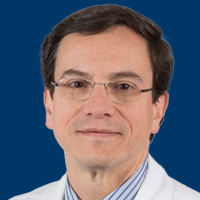Article
Hackensack Meridian Health Celebrates Opening of the Institute for Multiple Myeloma
Author(s):
Hackensack Meridian Health, New Jersey’s largest and most comprehensive healthcare network, is proud to announce the opening of the Institute for Multiple Myeloma which will support groundbreaking research to enhance treatment of this rare cancer.
Cutting the ribbon from left to right: John K. Lloyd, co-CEO, Hackensack Meridian Health; Robert C. Garrett, co-CEO, Hackensack Meridian Health; Andrew Pecora, MD, president of Physician Services and chief innovations officer, Hackensack Meridian Health; David Siegel, MD, PhD, founding director of the Institute for Multiple Myeloma; chief of the Multiple Myeloma Division, John Theurer Cancer Center; Sol J. Barer, chairman of the Board of Directors, Teva; Mark Alles, chair and CEO of Celgene Corporation; Andre’ Goy, MD, chair and director, chief of Lymphoma and director of Clinical and Translational Cancer Research at John Theurer Cancer Center; and David S. Perlin, PhD, executive director, PHRI, Rutgers New Jersey Medical School.
Hackensack Meridian Health, New Jersey’s largest and most comprehensive healthcare network, is proud to announce the opening of the Institute for Multiple Myeloma which will support groundbreaking research to enhance treatment of this rare cancer.
“This new center takes us a quantum leap forward in the fight against Multiple Myeloma and related illnesses,’’ said Robert C. Garrett, co-CEO of Hackensack Meridian Health. “This helps us achieve something that has been elusive — curing significant numbers of patients.’’
The John Theurer Cancer Center at Hackensack University Medical Center has built one of the world’s largest multiple myeloma programs, with more than 2,000 patients on active therapy. Multiple Myeloma is a rare cancer affecting certain cells found in bone marrow. The American Cancer Society estimates that about 30,000 cases will be diagnosed this year.
“This is our moment to leverage our shared vision, talents, knowledge and expertise into a comprehensive institute that will exponentially expand our fight against multiple myeloma,’’ said Andrew Pecora, M.D., president, Physician Services Division and chief innovation officer at Hackensack Meridian Health.
Led by David Siegel, M.D., Ph. D., founding director of the Institute for Multiple Myeloma, the new center will be housed in a state-of-the art research facility at the Hackensack Meridian Health Interprofessional Health Sciences Campus. The campus in Nutley and Clifton, New Jersey, is also home to the Hackensack Meridian School of Medicine at Seton Hall University, which welcomed its first class last month.
“We seek to transform the treatment of patients with multiple myeloma by integrating our extensive clinical expertise and research contributions with ongoing basic and translational research,’’ said Dr. Siegel, who is also chief of the Multiple Myeloma Division at John Theurer Cancer Center (JTCC) at Hackensack University Medical Center.
The Division completes more than 250 stem cell transplants for multiple myeloma patients each year. It is also the second largest enroller of patients in COMMpass study, the Multiple Myeloma Research Foundation’s (MMRF) Personalized Medicine Initiative, built on the new genome sequencing technologies discovered by JTCC and other leading research institutions.
“As one of the largest cohorts of patients, our team at John Theurer Cancer Center at Hackensack University Medical Center has built one of the best multiple myeloma programs in the world and has been involved in the most novel therapy developments for multiple myeloma over the last two decades,” said André Goy, MD, MS, chairman and executive director, division chief of Lymphoma, John Theurer Cancer Center; professor of medicine, Georgetown University. “Combining our clinical and research expertise, together with analytics and translational research at scale with thousands of multiple myeloma patients followed longitudinally, offers a unique platform for discovery. The Institute will continue to expand our mission for precision medicine in cancer including identifying the best sequence of care for each patient.”
Additionally the Division has developed relationships that have brought advanced immunotherapeutics to patient. This includes a robust bone marrow transplant program, CAR T-cell and NK-cell based therapies and more.
John Theurer Cancer Center and Georgetown Lombardi Comprehensive Cancer Center, a National Cancer Institute-designated Comprehensive Cancer Center, established a research partnership. This strategic collaboration has allowed the two institutions to leverage resources, capabilities, and expertise to accelerate discoveries in cancer research and clinical care. The combined strength also sparks collaborations with other academic cancer centers as well as the pharmaceutical industry. The shared goal of the research collaboration fosters combined leadership in basic cancer research and clinical care for the betterment of their patients.
Hackensack Meridian Health also formed a partnership with Memorial Sloan Kettering to create an exceptional uniform standard of care throughout the network’s acute care hospitals and expansive outpatient network.
The Center for Discovery and Innovation will open two additional centers — the Institute for Regenerative Medicine, which will become a leader in the emerging field of tissue-based therapy and the Institute for Cancer and Infectious Diseases.









